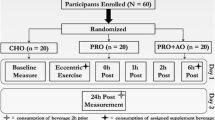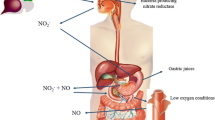Abstract
Purpose
Foods rich in antioxidant and anti-inflammatory phytochemicals might attenuate skeletal muscle damage; thus, the present study investigated whether consuming an antioxidant rich beetroot juice would attenuate the muscle-damaging effects of eccentric exercise.
Methods
Using a double blind, independent groups design, 30 recreationally active males were allocated to consume a high dose of beetroot juice (H-BT; 250 ml), a lower dose of beetroot juice (L-BT; 125 ml), or an isocaloric placebo (PLA; 250 ml) immediately (×3 servings), 24 (×2 servings) and 48 h (×2 servings) following completion of 100-drop jumps. Maximal isometric voluntary contractions (MIVC), countermovement jumps (CMJ), pressure pain threshold (PPT), creatine kinase (CK), interleukin-6 (IL-6), interleukin-8 (IL-8) and tumour necrosis factor-α (TNF-α) were measured pre, post, 2 (blood indices only), 24, 48 and 72 h following the drop jumps.
Results
CMJ performance recovered quicker (relative to baseline) in H-BT vs. PLA at 48 (91.7 ± 12.2 vs. 74.4 ± 17.3 %; P = 0.009, ES = 1.00) and 72 h postexercise (93.4 ± 7.7 vs. 86 ± 5.9 %; P = 0.046, ES = 1.25). PPT was greater in both the H-BT and L-BT vs. PLA at 24, 48 and 72 h postexercise (P < 0.001); PPT had returned to baseline in H-BT and L-BT at 72 h postexercise, but was still reduced in PLA (80.1 ± 28.9 % of baseline values). MIVC, CK, IL-6, TNF-α and IL-8 were unaffected by beetroot juice (P > 0.05).
Conclusions
Acute beetroot juice supplementation attenuated muscle soreness and decrements in CMJ performance induced by eccentric exercise; further research on the anti-inflammatory effects of beetroot juice are required to elucidate the precise mechanisms.


Similar content being viewed by others
References
Baker D, Wilson G, Carlyon B (1994) Generality versus specificity: a comparison of dynamic and isometric measures of strength and speed-strength. Eur J Appl Physiol 68:350–355
Bell PG, Walshe IH, Davison GW, Stevenson E, Howatson G (2014) Montmorency cherries reduce the oxidative stress and inflammatory responses to repeated days high-intensity stochastic cycling Nutrients 6:829–843
Bell PG, Walshe IH, Davison GW, Stevenson EJ, Howatson G (2015) Recovery facilitation with Montmorency cherries following high-intensity, metabolically challenging exercise. Appl Physiol Nutr Metab 40:414–423
Bondonno CP, Yang X, Croft KD, Considine MJ, Ward NC, Rich L et al (2012) Flavonoid-rich apples and nitrate-rich spinach augment nitric oxide status and improve endothelial function in healthy men and women: a randomized controlled trial. Free Radic Biol Med 52:95–102
Borg GA (1982) Psychophysical bases of perceived exertion. Med Sci Sports Exerc 14:377–381
Bowtell JL, Sumners DP, Dyer A, Fox P, Mileva KN (2011) Montmorency cherry juice reduces muscle damage caused by intensive strength exercise. Med Sci Sports Exerc 43:1544–1551
Brand-Williams W, Cuvelier ME, Berset C (1995) Use of a Free-Radical Method to Evaluate Antioxidant Activity. Food Sci Technol-Leb 28:25–30
Brickson S, Ji LL, Schell K, Olabisi R, Schneider BSP, Best TM (2003) M1/70 attenuates blood-borne neutrophil oxidants, activation, and myofiber damage following stretch injury. J App Phys 95:969–976
Byrne C, Eston R (2002) The effect of exercise-induced muscle damage on isometric and dynamic knee extensor strength and vertical jump performance. J Sports Sci 20:417–425
Byrne C, Twist C, Eston R (2004) Neuromuscular function after exercise-induced muscle damage: theoretical and applied implications. Sports Med 34:49–69
Cai Y, Corke H (1999) Amaranthus betacyanin pigments applied in model food systems. J Food Sci 64:869–873
Chatzinikolaou A, Fatouros IG, Gourgoulis V, Avloniti A, Jamurtas AZ, Nikolaidis MG et al (2010) Time course of changes in performance and inflammatory responses after acute plyometric exercise. J Strength Conditioning Res 24:1389–1398
Chazaud B, Brigitte M, Yacoub-Youssef H, Arnold L, Gherardi R, Sonnet C et al (2009) Dual and beneficial roles of macrophages during skeletal muscle regeneration. Exerc Sport Sci Rev 37:18–22
Close GL, Ashton T, Cable T et al (2006) Ascorbic acid supplementation does not attenuate post-exercise muscle soreness following muscle-damaging exercise but may delay the recovery process. Br J Nutr 95:976–981
Cockburn E, Bell PG, Stevenson E (2013) Effect of milk on team sport performance after exercise-induced muscle damage. Med Sci Sports Exerc 45:1585–1592
Connolly DA, McHugh MP, Padilla-Zakour OI, Carlson L, Sayers SP (2006) Efficacy of a tart cherry juice blend in preventing the symptoms of muscle damage. Br J Sports Med 40:679–683
Dousset E, Avela J, Ishikawa M, Kallio J, Kuitunen S, Kyrolainen H et al (2007) Bimodal recovery pattern in human skeletal muscle induced by exhaustive stretch-shortening cycle exercise. Med Sci Sports Exerc 39:453–460
El Gamal AA, AlSaid MS, Raish M et al (2014) Beetroot (Beta vulgaris L.) extract ameliorates gentamicin-induced nephrotoxicity associated oxidative stress, inflammation, and apoptosis in rodent model. Mediators Inflamm. doi:10.1155/2014/983952
Esatbeyoglu T, Wagner AE, Motafakkerazad R et al (2014) Free radical scavenging and antioxidant activity of betanin: electron spin resonance spectroscopy studies and studies in cultured cells. Food Chem Toxicol 73:119–126
Gomez-Cabrera MC, Domenech E, Romagnoli M et al (2008) Oral administration of vitamin C decreases muscle mitochondrial biogenesis and hampers training-induced adaptations in endurance performance. Am J Clin Nutr 87:142–149
Higashida K, Kim SH, Higuchi M, Holloszy JO, Han DH (2011) Normal adaptations to exercise despite protection against oxidative stress. Am J Physiol Endocrinol Metab 301:779–784
Hobbs DA, Kaffa N, George TW, Methven L, Lovegrove JA (2012) Blood pressure-lowering effects of beetroot juice and novel beetroot-enriched bread products in normotensive male subjects. Br J Nutr 108:2066–2074
Howatson G, van Someren KA (2008) The prevention and treatment of exercise-induced muscle damage. Sports Med 38:483–503
Howatson G, Goodall S, van Someren KA (2009) The influence of cold water immersions on adaptation following a single bout of damaging exercise. Eur J Appl Physiol 105:615–621
Howatson G, McHugh MP, Hill JA et al (2010) Influence of tart cherry juice on indices of recovery following marathon running. Scand J Med Sci Sports 20:843–852
Howatson G, Hoad M, Goodall S, Tallent J, Bell PG (2012) French DN (2012) Exercise-induced muscle damage is reduced in resistance-trained males by branched chain amino acids: a randomized, double-blind, placebo controlled study. J Int Soc Sports Nutr 9:20
Hyldahl RD, Hubal MJ (2014) Lengthening our perspective: morphological, cellular, and molecular responses to eccentric exercise. Muscle Nerve 49:155–170
Jadert C, Petersson J, Massena S et al (2012) Decreased leukocyte recruitment by inorganic nitrate and nitrite in microvascular inflammation and NSAID-induced intestinal injury. Free Radic Biol Med 52:683–692
Jädert C, Phillipson M, Holm L, Lundberg JO, Borniquel S (2014) Preventive and therapeutic effects of nitrite supplementation in experimental inflammatory bowel disease. Redox Biology 2:73–81
Justice JN, Gioscia-Ryan RA, Johnson LC et al (2015) Sodium nitrite supplementation improves motor function and skeletal muscle inflammatory profile in old male mice. J Appl Physiol 118:163–169
Kirby TJ, Triplett NT, Haines TL, Skinner JW, Fairbrother KR, McBride JM (2012) Effect of leucine supplementation on indices of muscle damage following drop jumps and resistance exercise. Amino Acids 42:1987–1996
Lechner JF, Wang LS, Rocha CM et al (2010) Drinking water with red beetroot food color antagonizes esophageal carcinogenesis in N-nitrosomethylbenzylamine-treated rats. J Med Food 13:733–739
Lundberg JO, Weitzberg CE, Gladwin MT (2008) The nitrate–nitrite–nitric oxide pathway in physiology and therapeutics. Nat Rev Drug Discov 7:156–167
Magalhaes PJ, Vieira JS, Goncalves LM, Pacheco JG, Guido LF, Barros AA (2010) Isolation of phenolic compounds from hop extracts using polyvinylpolypyrrolidone: characterization by high-performance liquid chromatography-diode array detection-electrospray tandem mass spectrometry. J Chromatogr A 1217:3258–3268
McLeay Y, Barnes MJ, Mundel T et al (2012) Effect of New Zealand blueberry consumption on recovery from eccentric exercise-induced muscle damage. J Int Soc Sports Nutr 9:19–28
Mossammer MR, Stintzing FC, Carle R (2005) Development of a process for the production of a betalain-based colouring foodstuff from cactus pear. Innov Food Sci Emerg 6:221–231
Murase S, Terazawa E, Queme F et al (2010) Bradykinin and nerve growth factor play pivotal roles in muscular mechanical hyperalgesia after exercise (delayed-onset muscle soreness). J Neurosci 30:3752–3761
Nussbaum EL, Downes L (1998) Reliability of clinical pressure-pain algometric measurements obtained on consecutive days. Phys Ther 78:160–169
Paulsen G, Mikkelsen UR, Raastad T, Peake JM (2012) Leucocytes, cytokines and satellite cells: what role do they play in muscle damage and regeneration following eccentric exercise? Exerc Immunol Rev 18:42–97
Paulsen G, Hamarsland H, Cumming KT et al (2014) Vitamin C and E supplementation alters protein signalling after a strength training session, but not muscle growth during 10 weeks of training. J Physiol 592:5391–5408
Peake JM, Della Gatta P, Suzuki K, Nieman DC (2015) Cytokine expression and secretion by skeletal muscle cells: regulatory mechanisms and exercise effects. Exerc Immunol Rev 21:8–25
Pietrzkowski Z, Spórna A, Stalica P et al (2010) Influence of betalain-rich extract on reduction of discomfort associated with osteoarthritis. New Med 1:12–17
Pietrzkowski Z, Argumedo R, Shu C et al (2014) Betalain-rich red beet concentrate improves reduced knee discomfort and joint function: a double blind, placebo-controlled pilot clinical study. Nutr and Diet Suppl 2014:9–13
Pizza FX, Baylies H, Mitchell JB (2001) Adaptation to eccentric exercise: neutrophils and E-selectin during early recovery. Can J Appl Physiol 26:245–253
Pizza FX, Peterson JM, Baas JH, Koh TJ (2005) Neutrophils contribute to muscle injury and impair its resolution after lengthening contractions in mice. J Physiol 562:899–913
Ristow M, Zarse K, Oberbach A et al (2009) Antioxidants prevent health-promoting effects of physical exercise in humans. Proc Natl Acad Sci 106:8665–8670
Shahidi F, Ho CT (2007) Antioxidant Measurement and Applications: an Overview. Acs Sym Ser 956:2–7
Szaefer H, Krajka-Kuzniak V, Ignatowicz E, Adamska T, Baer-Dubowska W (2014) Evaluation of the effect of beetroot juice on DMBA-induced damage in liver and mammary gland of female Sprague-Dawley rats. Phytother Res 28:55–61
Tidball JG (2005) Inflammatory processes in muscle injury and repair. Am J Physiol Regul Integrative Comparative Physiol 288:345–353
Toumi H, Best TM (2003) The inflammatory response: friend or enemy for muscle injury? Br J Sports Med 37:284–286
Trombold JR, Barnes JN, Critchley L, Coyle EF (2010) Ellagitannin consumption improves strength recovery 2-3 d after eccentric exercise. Med Sci Sports Exerc 42:493–498
Vidal PJ, Lopez-Nicolas JM, Gandia-Herrero F, Garcia-Carmona F (2014) Inactivation of lipoxygenase and cyclooxygenase by natural betalains and semi-synthetic analogues. Food Chem 154:246–254
Webb AJ, Patel N, Loukogeorgakis S, Okorie M, Aboud Z, Misra S et al (2008) Acute blood pressure lowering, vasoprotective, and antiplatelet properties of dietary nitrate via bioconversion to nitrite. Hypertension 51:784–790
Weitzberg E, Lundberg JO (2013) Novel aspects of dietary nitrate and human health. Annu Rev Nutr 233:129–159
Wootton-Beard PC, Brandt K, Fell D, Warner S, Ryan L (2014) Effects of a beetroot juice with high neobetanin content on the early-phase insulin response in healthy volunteers. J Nutr Sci 3:9
Yfanti C, Akerstrom T, Nielsen S et al (2010) Antioxidant supplementation does not alter endurance training adaptation. Med Sci Sports Exerc 42:1388–1395
Author information
Authors and Affiliations
Corresponding author
Ethics declarations
Conflict of interest
This study was funded as part of a doctoral degree that receives financial support from Gs Fresh Ltd. The funders supplied the supplements used in this study, but had no role in the conception of the study, its design, preparation, analysis and writing of the manuscript. The authors declare no conflict of interest.
Additional information
Communicated by Anni Vanhatalo.
Rights and permissions
About this article
Cite this article
Clifford, T., Bell, O., West, D.J. et al. The effects of beetroot juice supplementation on indices of muscle damage following eccentric exercise. Eur J Appl Physiol 116, 353–362 (2016). https://doi.org/10.1007/s00421-015-3290-x
Received:
Accepted:
Published:
Issue Date:
DOI: https://doi.org/10.1007/s00421-015-3290-x




